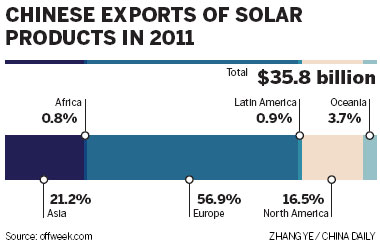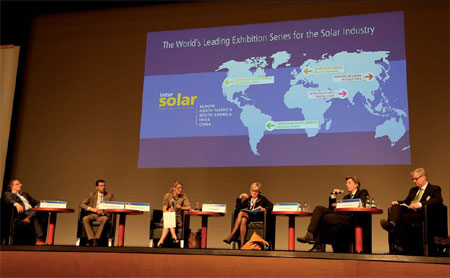Dumping case defies solution
Updated: 2013-06-21 08:56
By Fu Jing (China Daily)
|
|||||||||||
|
A panel discussion on China's solar industry was held during Intersolar Europe 2013 in Munich, Germany. Tuo Yannan / China Daily |

Photo-voltaic industry braces for onerous penalties that may wipe out many firms
With Beijing's negotiators returning to Brussels this week to look for a compromise over China's exports of solar panels to the European Union, insiders say finding a solution to the multi-billion-euro anti-dumping dispute has become difficult in the extreme.
China observers say it is likely a breakthrough can only be achieved when there is more political interaction in the lalter half of the year. As China Daily European Weekly went to press, neither side had revealed any new common ground, and both sides refused to be interviewed, saying negotiations were continuing.
Even as insiders insist that technical difficulties remain on how to persuade solar panel makers in China and Europe to accept any compromise, Beijing has started to take concrete measures to support the Chinese solar panel industry by expanding the domestic new energy market.
More than 100 Chinese solar panel exporters who have responded to the anti-dumping complaint are being represented by China's negotiators in Brussels. But how to make the individual enterprises agree on a compromise is difficult because of the varying size of investments they have and the costs they face.
There are estimated to be 1,000 solar panel makers in China employing more than 400,000 people. The exporters who have not responded to Brussels' complaint are likely to face the highest punitive tariffs if no collective compromise is reached.
Brussels has set a deadline for Beijing of Aug 6 for such a deal. Otherwise it will raise its temporary punitive tariff of anti-dumping from 11.8 percent to 47.6 percent until Dec 6, when the EU will decide whether the duties will be imposed for five years. If it decides to do so, Chinese solar panel makers whose main market is Europe will suffer huge losses, and many will face bankruptcy.
The EU is also in a tight corner. European Commission sources have been quoted as saying that even some Brussels trade negotiators want to "get rid of the case" because of mounting pressure from the bloc's member states and downstream enterprises that have more than 250,000 jobs that depend on Chinese exporters. Previously, 23 out of 27 member states had reportedly chosen not to support the commission's decision to punish Chinese exporters in a vote that the commission is not legally bound to adhere to.
In addition, some Europeans have complained that Brussels' trade negotiators have too much say in arbitrating in the anti-dumping case because of their power of "political interpretation" in trade regulations, one example of that being the range of penalty tariffs applicable in the present case, from 11.8 percent to 47.6 percent.
But EU legal procedure dictates that an exit is impossible if EU ProSun, the coalition of dozens of European solar maker plaintiffs, is unwilling to drop its complaint against its Chinese competitors, which have been exporting solar panels to Europe worth more than 20 billion euros annually.
The most likely outcome is that negotiations between now and Aug 6 will prove fruitless and that onerous anti-dumping tariffs will be imposed on Chinese exporters at least temporarily. Before the EU and China hold their annual summit in November, Beijing may take other steps. It recently launched an anti-dumping investigation on European wine exports, although it has insisted this is not a retaliatory measure.
"If the November summit is a constructive one, leaders from both sides will use their political wisdom and will to achieve compromise," says Glyn Ford, a senior China hand and former member of the European Parliament who has served five terms. "Then at the December summit of European leaders, they will finally vote against the commission's decision to extend punishment toward China's solar exports for another five years. I am looking forward to this scenario."
But Ford says that if the Beijing-Brussels summit turns sour in November, it will cause bilateral trade and the broader economic relationship long-term damage.
As negotiations on the solar panels issue continued in recent days, Fredrik Erixon, director of the European Centre for International Political Economy, says Brussels' decision to negotiate with Beijing and impose two-level temporary punitive tariffs was "improper use" of trade defense instruments.
Matters of alleged dumping and anti-dumping measures ought to be based on rules and regulations, which should be technically easy to judge and predict, he says, criticizing the commission's resorting to political interpretation to decide what actions to take.
In the solar-panel case it would be easy for the commission to rule whether or not dumping has taken place, taking action if it has, and rejecting the complaint if it has not, he says.
"What is worrying me now is the trade defense issue is highly politicized and the commission has used the negotiation as a leverage to negotiate with the Chinese government. It is very clear that the commission wants to use opaque trade practices and political analysis to obtain other trade gains."
Erixon says what worries him even more is so-called ex officio anti-dumping and an anti-subsidy investigation of China's mobile telecommunication network exports, in which no European competitors filed any complaint.
"This is clearly another highly politicized case of using trade defense instruments by the European Commission."
Erixon says Brussels now finds itself hemmed in, with strong protests from member states and China threatening to retaliate, something that would not be in the EU's best interests.
"On the other hand, they are bound by European regulations that if there is a complaint they have to move on with it," he says.
While both sides were trying to find a compromise, France's President Francois Hollande urged EU leaders to hold a summit over the row, but by June 20 there had been no response from Brussels.
Hollande's government has supported the commission's decision to punish Chinese solar panel exporters, but French wine producers would be some of the biggest losers if China found a case against European wine dumping proven and took action.
It is possible the dispute will be discussed at a European Union leaders summit over two days from June 27.
While castigating Brussels over possible punitive tariffs against Chinese exports, Chinese Premier Li Keqiang has urged both sides to find a solution through consultation.
As negotiations have continued, China has introduced measures to foster its domestic new energy market to absorb overcapacity in the photo-voltaic industry, which has been the beneficiary of central government development support since the 2008-09 global economic crisis.
The government says the sector has now become competitive globally but faces difficulties because of subdued overseas demand.
Xinhua News Agency quoted a government statement as saying the government will take more initiatives to promote solar photo-voltaic power projects to increase photo-voltaic use and Chinese power suppliers on the grid are being urged to give priority to buying solar power.
It also says power transmission lines linking production plants and grid companies must be built at the same time as solar power plants, and that the transmission lines and the power plants must be put into operation at the same time.
"China will improve policies to support more solar power facilities with government subsidies in power pricing," a government statement said. "The renewable energy fund will be expanded to ensure that more distributed PV projects receive government subsidies in time."
Financial institutions are being encouraged to support PV companies and help them overcome financing difficulties, the statement said. "To foster bigger and stronger companies and curb the blind expansion of production capacity, China will encourage mergers and reorganizations among PV makers."
fujing@chinadaily.com.cn
(China Daily European Weekly 06/21/2013 page7)
Today's Top News
List of approved GM food clarified
ID checks for express deliveries in Guangdong
Govt to expand elderly care
University asks freshmen to sign suicide disclaimer
Tibet gears up for new climbing season
Media asked to promote Sino-Indian ties
Shots fired at Washington Navy Yard
Minimum growth rate set at 7%
Hot Topics
Lunar probe , China growth forecasts, Emission rules get tougher, China seen through 'colored lens', International board,
Editor's Picks

|

|

|

|

|

|






